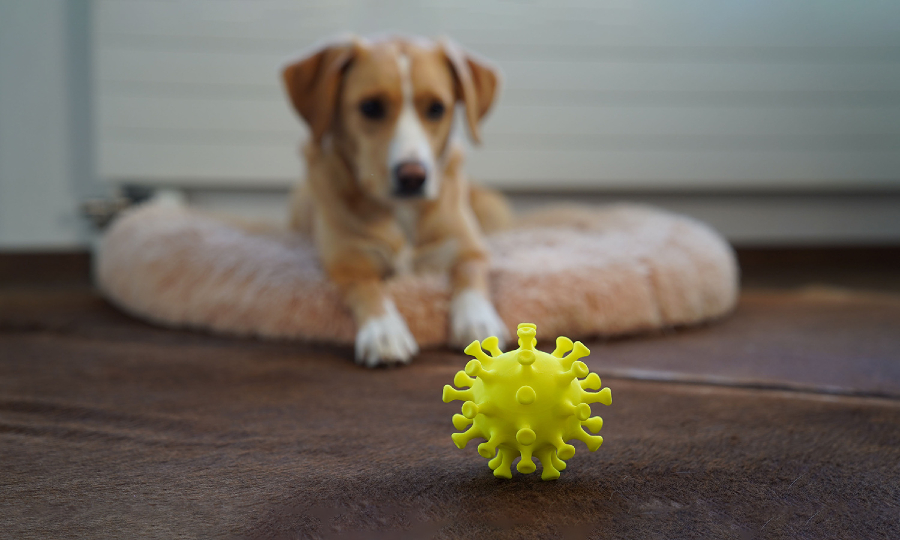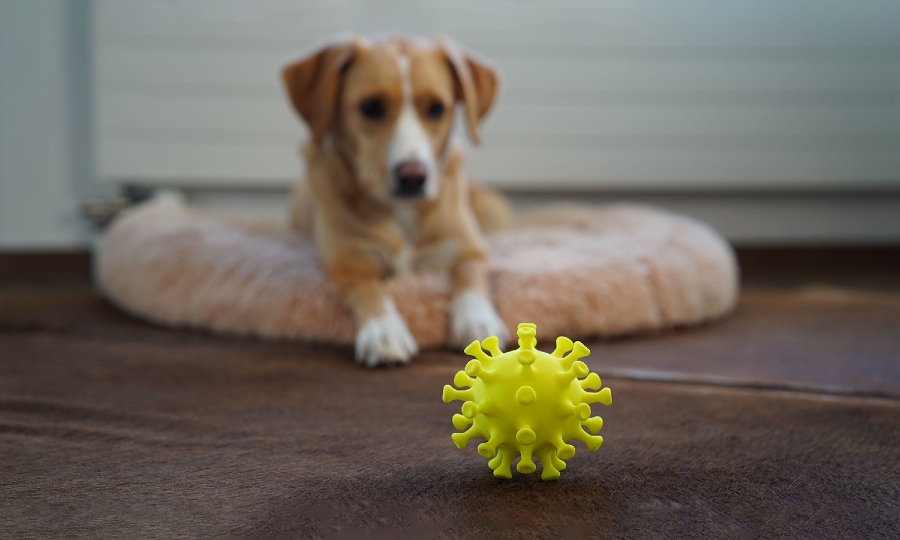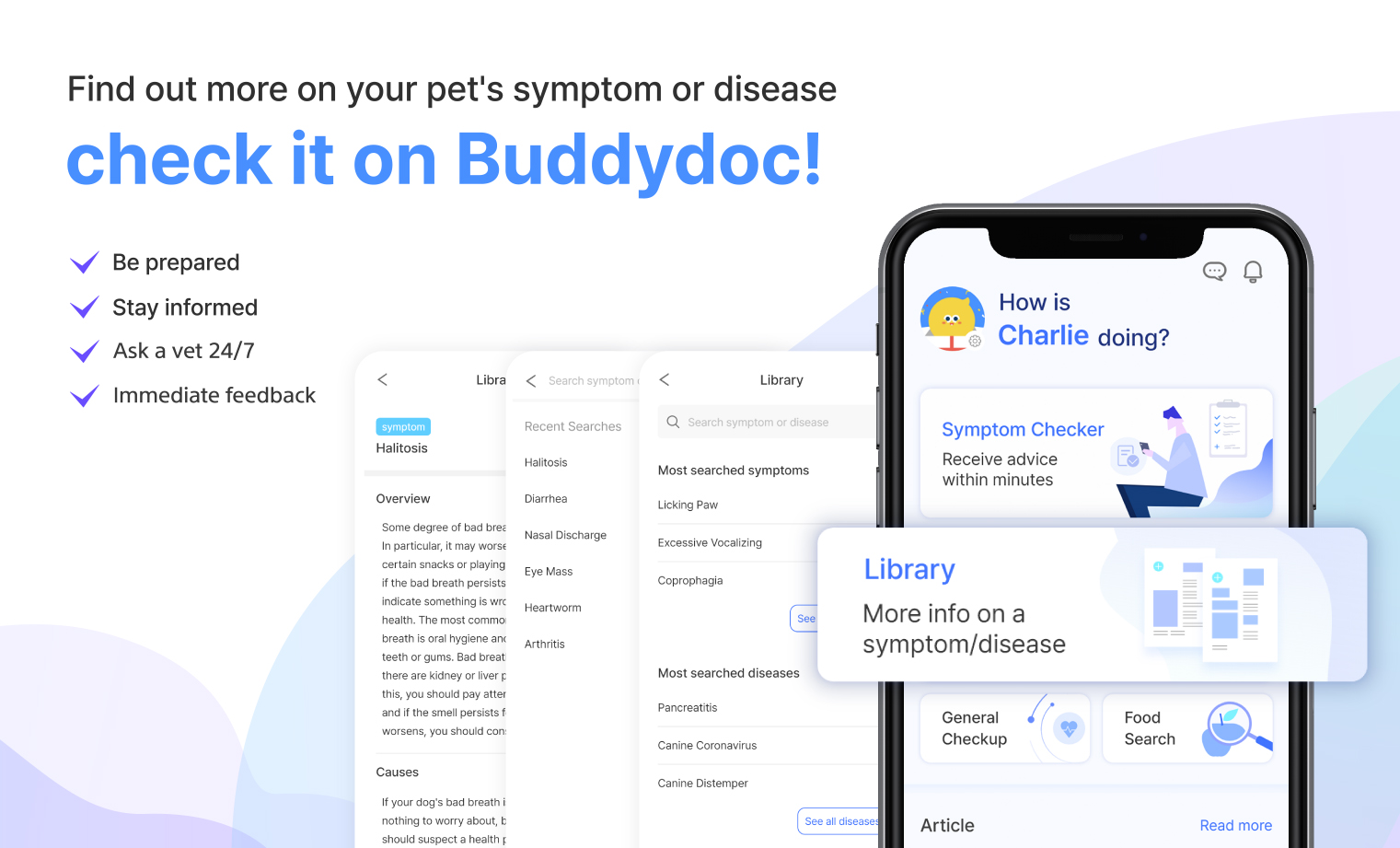DISEASES
Canine Coronavirus – Causes, Symptoms, and Treatment
페이지 정보
본문


What is canine coronavirus (CcoV)?
Canine coronavirus (CCoV) is a highly contagious disease that mainly causes symptoms related to the digestive system in dogs. Young puppies who have not been vaccinated or dogs with weak immune systems are at increased risk of infection. It should be noted that this virus is different from the COVID-19 virus in humans, as CCoV cannot infect humans.
There are two main types of CCoV that infect dogs. Canine enteric coronavirus(CECoV) spreads through feces and usually presents gastrointestinal symptoms such as vomiting, diarrhea, decreased appetite, and lethargy. Canine respiratory coronavirus (CRCoV) spreads through the air and causes respiratory problems such as coughing, sneezing, runny nose, and shortness of breath.
How is CCoV spread between dogs?
Not all dogs that come into contact with the virus will become infected. Several factors play a role, such as how a dog came into contact with the virus, a dog's immune status, and the amount of virus the dog is exposed to.
The following is how both types of CCoV are transmitted:
-
Canine Enteric Coronavirus (CECoV)
It is transmitted by oral contact with infected feces and has an incubation period of 1 to 4 days after exposure. It mainly affects young puppies and causes a highly contagious intestinal infection.
It infects the intestines and damages the intestinal epithelial cells, resulting in symptoms such as vomiting, diarrhea, and lethargy. Symptoms may be more severe for younger puppies or dogs with weakened immune systems.
-
Canine Respiratory Coronavirus (CRCoV)
It is similar to the common cold in humans and causes respiratory tract infections through air transmission.
CRCoV respiratory problems include coughing, runny nose, and shortness of breath. It spreads more quickly through contact with an infected dog in confined or crowded facilities and stressful environments. Dogs with CRCoV, in combination with other viruses and bacteria in the environment, can lead to Canine Infectious Respiratory Disease Complex (CIRDC).
The main symptoms of canine coronavirus
Healthy adult dogs may not show clinical symptoms even after infection and may recover independently. Although highly contagious, canine coronavirus infections are usually mild and digestive symptoms may resolve themselves without treatment.
Depending on the type of coronavirus infected, the following symptoms can be observed:
-
Canine Enteric Coronavirus (CECoV)
- Diarrhea (bad smell, blood, or mucus)
- Vomiting
- Decreased appetite
- Lethargy
- Abdominal pain
- Dehydration
- Fever
- Seizures (severe)
-
Canine Respiratory Coronavirus (CRCoV)
- Coughing
- Sneezing
- Shortness of breath
- Tears
- Runny nose
- Fever
- Lethargy
- Decreased appetite
Risk factors for canine coronavirus
The canine coronavirus has an incubation period of about 1 to 4 days after infection until clinical symptoms appear, and most of the symptoms last about 2 to 10 days. However, secondary infections due to other bacteria, parasites, and viruses may prolong the period and slow recovery. Dogs shed the virus in feces for up to 2 weeks, with or without symptoms, and can carry the virus for up to 6 months.
Another virus that can commonly cause diarrhea is canine parvovirus, which can make the disease more severe if infected with parvovirus alongside CCoV.

Your dog may be more susceptible to the canine coronavirus if the following applies:
- Young, puppy
- Not vaccinated
- Weak immune system
- Stress
- Frequent kennel or dog daycares
- Engages with other dogs daily
- Shares household with multiple dogs
In a household with multiple dogs, isolating dogs is necessary. Since the canine coronavirus is highly contagious, proper disinfection of the dog's home and items used by other dogs and infected dogs is essential to prevent transmission.
When to see a vet for canine coronavirus
If your dog has sudden diarrhea, lethargy, and loss of appetite and does not recover within a day, it is recommended to visit a veterinary hospital. Persistent diarrhea and vomiting can lead to shock due to dehydration, and bloody diarrhea can lead to anemia and shock due to intestinal bleeding. Canine coronavirus often recovers within 2 weeks if treated early, but in severe cases, it may lead to death.
Home treatment for canine coronavirus
It's a good idea to create a warm environment and keep an eye on your dog’s water intake to avoid dehydration from frequent vomiting and diarrhea. Suppose the symptoms are severe, such as vomiting and diarrhea lasting more than a day. In that case, it is recommended to visit the veterinary hospital as soon as possible. An additional treatment, such as aggressive fluid treatment and nutrition, is required to replace lost fluids. However, if diarrhea stops, fasting for 24 hours and slowly reintroducing small portions of their food can be attempted.
Diagnosing canine coronavirus at the vet
A veterinarian makes a comprehensive diagnosis based on whether the patient has been vaccinated, the patient's age and health condition, and the clinical symptoms present.
The following is a list of various tests a veterinarian may conduct to conduct CCoV:
-
Kit test
It is a method of detecting the coronavirus antigen in feces by combining it with an antibody through the ELISA (enzyme-linked immunosorbent assay) method. The test takes approximately 15 minutes but may result in false-positive and false-negative results.
-
PCR test
This is a method of detecting the DNA of the virus in feces through the PCR (polymerase chain reaction) method. This method is more accurate than the ELISA method, but it may take several days because it is carried out by sending the sample to a laboratory.
-
Blood tests
-
X-rays
A veterinarian can determine the degree of anemia due to dehydration and bleeding, and damage to other organs, including secondary infections, can be evaluated. It can also help rule out other diseases and help determine if additional antibiotics or other treatments are needed.
Treatment for canine coronavirus (CCoV)
The veterinarian will evaluate the dog's overall health condition and proceed with appropriate treatment. Since no drugs can directly treat the canine coronavirus, treatment is provided to assist a dog’s immune system in fighting the virus. This may include correction of dehydration with fluid and electrolyte replacement. If vomiting and diarrhea persist, supplement nutrition and a warm environment at home will be recommended. A veterinarian may prescribe antiemetics or antidiarrheal drugs to stop vomiting and diarrhea.
Antibiotics are co-administered when secondary infection occurs due to a dog’s intestinal wall or respiratory tract becoming compromised. If you have respiratory symptoms, A veterinarian may prescribe anti-inflammatory or cough medications, and oxygen or a nebulizer may be used to assist ingestion.
How to prevent canine coronavirus
CECoV infection has a vaccine available, but it is considered a non-core vaccine. For unvaccinated or immunocompromised dogs, avoid going to places where many dogs are (such as dog play areas). Also, avoid curious behavior towards other dogs' feces, such as sniffing and licking, while on walks. Canine coronavirus is highly contagious, so if you have other dogs, isolation and proper disinfection of the environment and items used by the dog are necessary to prevent transmission. A mixture of bleach and water at about a 1:30 ratio can effectively kill the virus.
Find out more about your dog’s disease or symptoms in the Buddydoc Library!

The Buddydoc library is filled with everything you’d want to know about each symptom and disease your pet may experience. If you would like to find out more about the causes, signs, treatments, preventions, and more for your dog’s disease. Try out the Buddydoc app and search your pet’s symptom or disease in the Buddydoc library.












